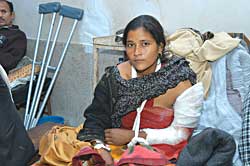 With hopes receding for an early ceasefire, pressure is building up for the government to at least sign a draft accord on human rights so that more innocent lives are not lost and the conflict is conducted according to international humanitarian norms.
With hopes receding for an early ceasefire, pressure is building up for the government to at least sign a draft accord on human rights so that more innocent lives are not lost and the conflict is conducted according to international humanitarian norms. Nepal's international donors, human rights organisations and domestic civil society are lobbying hard to convince the army that it is in its own interest to sign the accord and remedy the bad press it has been getting for disappearances, extra-judicial killings and deaths of civilians.
They argue that the draft accord prepared by the National Human Rights Commission doesn't contain anything that Nepal hasn't already ratified in various key international treaties. For its part, the army has been trying to clean up its act, announcing last week that it had jailed and discharged 25 soldiers, including a major, after investigations of serious rights violations. At another press meet on Thursday, Liz Rowsell of the Amnesty International team, which completed inspections in several districts last week, urged both the army and the Maoists to sign the accord. She told us: "The situation is extremely grave in Nepal. It is almost certain to become a catastrophe unless the international community, the government, civil society and others take action now."(See interview)
French ambassador to Nepal, Claude Ambrosini who is looking after the interests of the current European President, Ireland, met the prime minister on Monday with other EU ambassadors, urging greater attention to human rights and brought up the subject of signing the accord. But officials told us the army was still not completely convinced, and signing now could undermine morale in the field and be seen as an admission of guilt.
Donor pressure has been growing ever since they grudgingly agreed to a $70 million World Bank budget support in November. The EU statement this week warned of serious consequences for development assistance if Nepal's parliamentary crisis dragged on.
Activists say the Maoists indicated during the ceasefire last year that they were willing to sign the human rights accord. Rebel leader Prachanda, in a surprisingly soft statement on Thursday, welcomed the EU's call for a ceasefire and a negotiated settlement. He reiterated his group's acceptance of any UN mediation or facilitation towards that end.
Human rights activists have urged the government to convince the army that it has to seize the initiative and sign the accord first since and gain the moral high ground. The army needs to clean up its tarnished international image, which activists say could impact on future UN peacekeeping duties.
The army argues that donors and human rights groups are putting disproportionate pressure on the forces for violations, and say Maoist atrocities don't come under as much scrutiny. "We know what we have to do, we are sensitive to human rights, but these criticisms are theoretical. We are fighting a guerrilla war, the ground reality is different," said one senior military source.
Even so, human rights activists say that as the legitimate state party, it is the duty of the army to be more responsible than the rebels. One diplomat told us: "If the Maoists signed first, it would be a PR disaster for the government."
Under the accord, there would be monitoring teams in the field that can be quickly deployed to conduct on-the-spot investigation of incidents. It could minimise distortions and inaccurate field reports as well as protect citizens from harm. And when the peace talks do restart, it will help in confidence-building and safeguarding the ceasefire.


